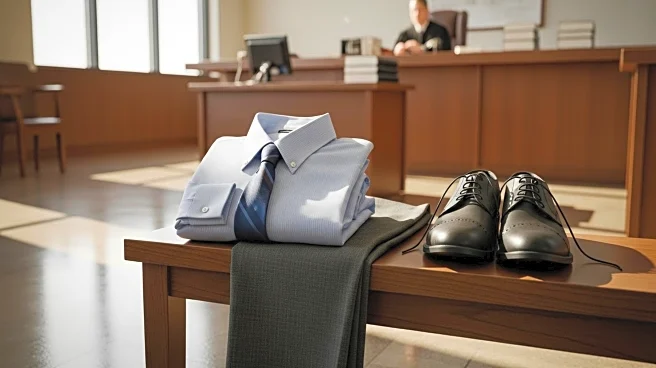What's Happening?
Tyler Robinson, accused of assassinating conservative activist Charlie Kirk, has requested to appear in civilian clothing during court proceedings. His legal team argues that wearing prison attire could prejudice potential jurors, impacting his right to a fair trial. The motion, filed in Utah's 4th District Court, references the case of Bryan Kohberger, an Idaho murderer who was allowed to wear a suit during pretrial hearings. Robinson, charged with aggravated murder, faces the possibility of the death penalty under Utah law. The case has garnered significant media attention, with concerns that Robinson's appearance in shackles and prison garb could influence juror perceptions of his guilt.
Why It's Important?
The request highlights ongoing debates about the influence of pretrial publicity and courtroom appearances on jury impartiality. Allowing Robinson to wear civilian clothes could mitigate potential biases, ensuring a fair trial. The case underscores the challenges of maintaining judicial fairness in high-profile cases, where media coverage can shape public perception. The outcome may set precedents for similar cases, affecting how defendants are presented in court. The decision could impact Robinson's defense strategy and the broader discourse on capital punishment, especially given President Trump's public support for the death penalty in this case.
What's Next?
Robinson is scheduled to return to court on October 30, where the judge will likely address the motion regarding his courtroom attire. The decision could influence pretrial proceedings and jury selection. If granted, Robinson's appearance in civilian clothing may alter public and juror perceptions, potentially affecting trial outcomes. Legal experts and civil rights advocates may weigh in on the implications for judicial fairness and defendants' rights. The case will continue to attract media attention, with potential reactions from political figures and advocacy groups.
Beyond the Headlines
The case raises ethical questions about the balance between public safety and individual rights. It highlights the role of media in shaping legal narratives and the potential for bias in high-profile trials. The decision on Robinson's attire could influence broader discussions on the death penalty and its application in the U.S. The case may also prompt legal reforms regarding courtroom procedures and defendants' rights, particularly in cases with significant media coverage.









